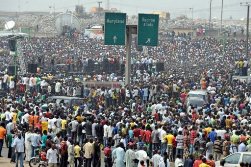 Petrol is already beyond the price range of many Africans while surging population levels should force governments in Asia to limit car use, political and business leaders said Wednesday.
Petrol is already beyond the price range of many Africans while surging population levels should force governments in Asia to limit car use, political and business leaders said Wednesday.
While economic gloom in the eurozone is the most immediate concern of delegates gathered here for the annual Davos forum, the challenge of feeding and powering an ever expanding planet is the main long-term headache.
As tensions with Iran and Nigeria once more raise fears about oil supplies — and Japan’s Fukushima disaster undermines the appeal of nuclear energy — titans of politics and industry admit it is time for a radical reappraisal.
Ethiopia’s Prime Minister Meles Zenawi, whose country’s population is forecast to jump by 73 percent by the middle of the century, said that merely following the Western path of development was not an option.
“In my view Africa has no option but to go through the green path to development. We have to adjust — no matter what happens with the climate change negotiations,” he said, referring to stalled UN-led climate talks.
Meles said the high cost of traditional energy could ultimately benefit the developing world by forcing the pace of change.
“Most Africans will be priced out of modern energy, therefore it is crucial (to have) access to biofuels, solar power,” said Meles.
“I do not know how it looks in developed countries, but in Africa we think fossil fuels already are being rationed… Maybe it’s a blessing in disguise, forcing us to look for alternative supplies.”
Oil executives admit that they must confront the strains imposed by ever-increasing demand on the energy supply chain.
“We need to look at how we can deal with the stress we have in our security around food, water and energy,” said Shell boss Peter Voser.
“From the energy point of view, it’s about sustainability,” added the chief executive of the Anglo-Dutch oil and gas giant, pointing out that there are 1.5 billion people worldwide without access to electricity.
Some analysts, however, argue governments will have to intervene to slow up the demand for fuel, particularly in cities already facing traffic gridlock.
“Asian cities need more cars like I need a hole in the head,” said Chandran Nair, founder of the Hong Kong-based Global Institute for Tomorrow.
Nair said that “we will need very draconian rules” to prevent things getting totally out of hand as car ownership mushrooms in Asia.
“If the Chinese can interfere with your reproductive system, then they can interfere with your car,” he said, in reference to Beijing’s one child policy.
Nair, who lives in one of the world’s most-heavily populated strips of land, said it would be a nightmare if Asian development followed the path of the West where people are chained to their cars and “emissions are a right”.
“Imagine a world in 2050 whereby you have five to six billion Asians who are consuming as you are,” he said.
The strain would not only be on energy supplies but also on food if Asia followed the path and consumed more meat as it grows wealthier, he added.
Paul Polman, the chief executive of food giant Unilever, said that it was vital to come up with news way to feed a growing population.
“It’s very clear that the system we have been operating has been very beneficial to many but requires big changes,” he said


